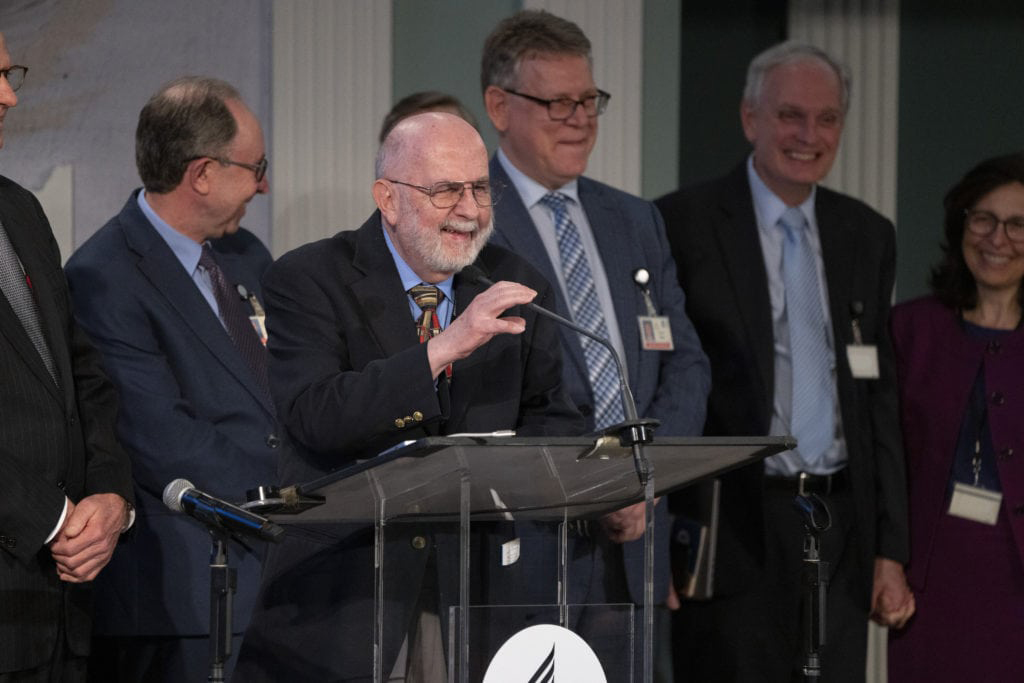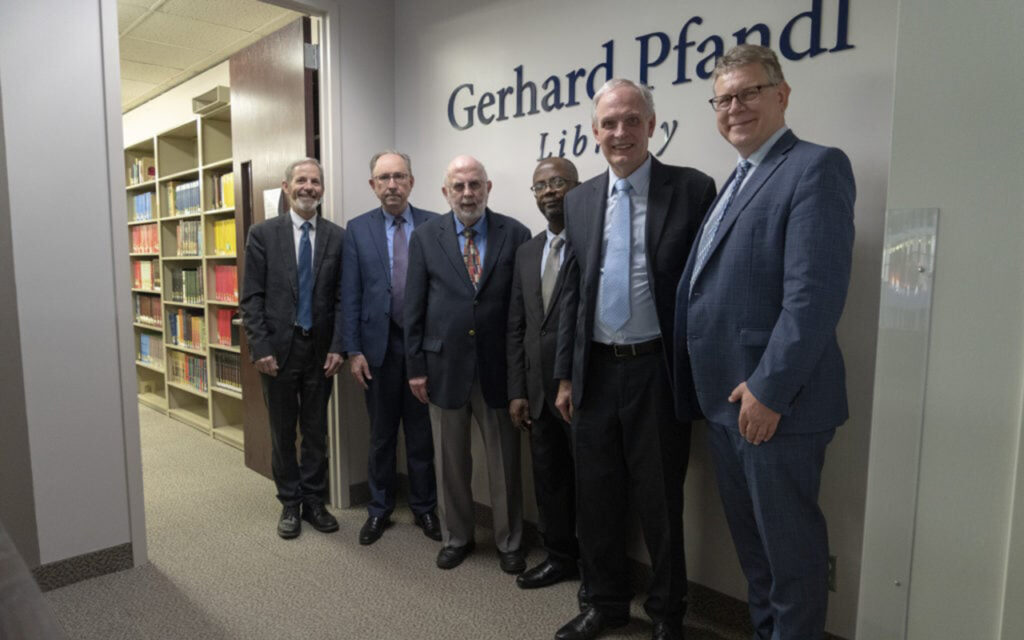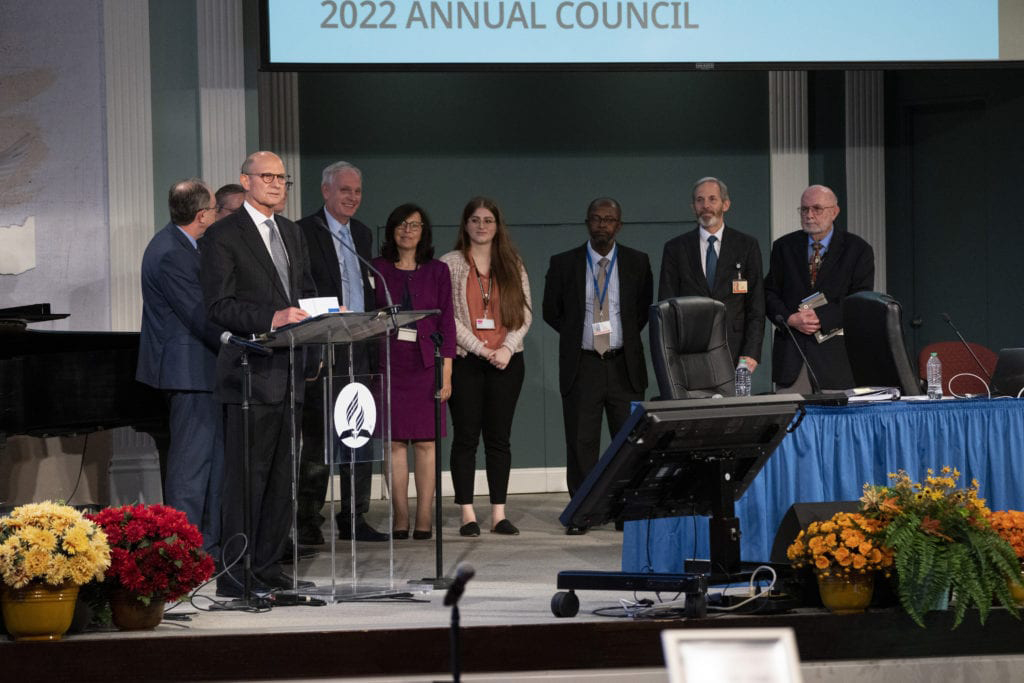Leaders Dedicate Scholarly Library at General Conference Headquarters
Facility named after experienced Biblical Research Institute theologian Gerhard Pfandl.
October 12, 2022 | Silver Spring, Maryland, United States | Marcos Paseggi, Adventist Review
Seventh-day Adventist Church leaders dedicated a revamped reference and research library at the General Conference (GC) headquarters in Silver Spring, Maryland, United States on October 10, 2022. The remodeled facility, defined by Biblical Research Institute (BRI) leaders as “one of its most valuable assets,” was named after retired BRI associate director Gerhard Pfandl.
“One of the BRI resources that is a matter of great pride to us is our library,” current BRI director Elias Brasil de Souza said. “It holds a full collection of scholarly literature and related books that are indispensable to our research.”
The BRI library had humble beginnings in a small room at the church’s headquarters. Since then, however, its collections have greatly expanded. “For years, the BRI has acquired theological books and periodicals to stay current and provide needed resources for scholarly research,” a narrator in an introductory video said. Pfandl still volunteers at the library, after working for years to keep it up to date.

Gerhard Pfandl, retired associate director of the Biblical Research Institute poses in the newly dedicated BRI library on Monday afternoon, Oct. 10, 2022, during the Annual Council 2022, Silver Spring, Maryland, United States of America. [Photo: Enno Müller, Adventist Review]
Pfandl, who had not been told that the revamped library would be named after him, was extremely surprised by the announcement. “This is the surprise of my life … I have never heard of a living person receiving that [honor],” he said.
He also acknowledged those church leaders who supported the library through the years. “I want to thank the General Conference and the treasury for the support and the possibility of acquiring the hand tools that we need in order to do the work that we are supposed to do,” he said.

he Biblical Research Institute library has been named after retired BRI theologian Gerhard Pfandl. He was instrumental in expanding the library’s collection and still volunteers as a keeper of the collection. [Photo: Enno Müller, Adventist Review]
About the BRI
The Biblical Research Institute (BRI) was established in 1975 by the General Conference to explore biblical truth and advance the practice and study of Adventist theology and lifestyle. Its goal is also to provide theological expertise and resources for the administration and departments of the General Conference and the world church.
The BRI responsibilities include biblical research, apologetics, and service. It is also responsible for the publication of academic research. The materials produced are vetted by the Biblical Research Institute Committee (BRICOM) and the Biblical Research Institute Ethics Committee (BRIEC).

The Biblical Research Institute team poses in front of the newly dedicated BRI library on Monday afternoon, Oct. 10, 2022, during the Annual Council 2022, Silver Spring, Maryland, United States of America.
According to BRI leaders, the institute’s major areas of focus in the last five years have included hermeneutics, ethics, a biblical theological dictionary, and publications that have served colleges, universities, and theologians around the world.
Since 2015, books edited by various BRI members and scholars have been published on a variety of topics, ranging from the Sabbath in the Old Testament and the New Testament, sexuality and family life, and a textbook on the book of Daniel. The BRI bookshop currently sells more than 30 volumes, and they are also available on Logos.com and Amazon.
The biblical theological dictionary, with more than 6,000 entries, will include biblical, theological, ethical, and historical topics related to the Seventh-day Adventist message, mission, and lifestyle. A website offers hundreds of articles that have been written and published by scholars to equip Adventist pastors and anyone who would like to understand the Bible.

Ted N. C. Wilson, General Conference president, reveals the name of the Biblical Research Institute library on Monday afternoon, Oct. 10, 2022, during the Annual Council 2022, Silver Spring, Maryland, United States of America.
The BRI has also produced several booklets known as BRI releases, on various topics related to Adventist beliefs such as “Creation and the Three Angels’ Messages,” “Daniel 11 and the Islam Interpretation,” and other important issues. It also offers a newsletter known as the BRI “Reflections,” which offers new and exclusive articles, book reviews, and other free materials.
In the last few years, BRI has expanded its reach through social media, including Twitter, Instagram, YouTube, and Facebook, to share the wide variety of available resources that they produce. The goal, BRI leaders said, is to keep serving the church to the best of their abilities. “[We want] to keep current and stay relevant to the younger generation and address the future needs of the church,” they said.